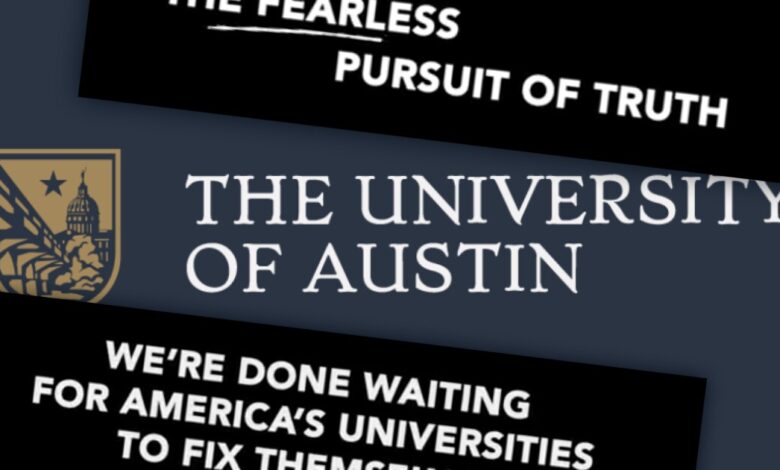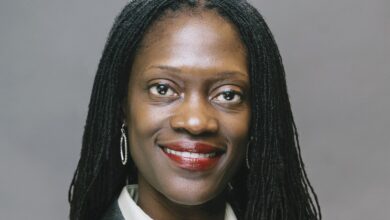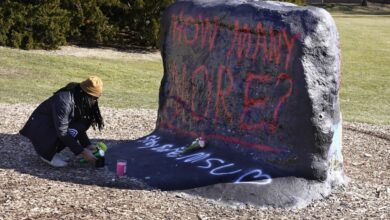A Planned University ‘Dedicated to Truth’ Will Welcome ‘Witches Who Refuse to Burn’

Just blocks from the University of Texas at Austin, planning for a new “University of Austin” is underway, supported by academics and intellectuals who say they’ve been shunned because of their beliefs. The university, they vow, will be “dedicated to the fearless pursuit of truth” and welcome “witches who refuse to burn.”
The announcement on Monday evoked images of cavalry battling brigades of thought police that one would expect to find in “oppressive regimes in distant lands.”
It is to be led by Pano Kanelos, who resigned in June as president of St. John’s College in Annapolis. He made the announcement in a newsletter published on Monday by Bari Weiss, a writer and editor who resigned last year from the The New York Times after accusing colleagues of constantly bullying her over her more conservative views. Weiss, who’s helping start the planned university, posted the tweet about welcoming witches who refuse to burn.
The modern university, Kanelos wrote, no longer protects freedom of inquiry and civil discourse, instead punishing people for unfashionable views.
“What unites us is a common dismay at the state of modern academia and a recognition that we can no longer wait for the cavalry,” Kanelos wrote. “And so we must be the cavalry.”
The university’s planners, who are working on securing land for a physical campus, have attracted some big names to the board of directors, including E. Gordon Gee, president of West Virginia University, and Lawrence H. Summers, president emeritus of Harvard University.
Skeptics have pointed out the difficulty and expense of starting a new college and the risks to students who enroll in one. In 2007, Founders College, a for-profit institution in rural South Boston, Va., was started as a kind of Great Books college for devotees of Ayn Rand. The state of Virginia authorized it to issue degrees at a time when it had no official faculty, no facilities, and shaky finances. The college was never accredited and closed in 2008.
The University of Austin will seek accreditation from the Higher Learning Commission, a regional accreditor, once it gets up and running, Kanelos said. It would probably take about four or five years to become fully accredited, he said. A spokeswoman for the accreditor said it had received an inquiry from the planned university.
This summer, a “Forbidden Courses” program will offer “a spirited discussion about the most provocative questions that often lead to censorship or self-censorship in many universities.”
By next fall, the planned university hopes to have a master’s in entrepreneurship and leadership running, Kanelos said, with other master’s degrees following, and programming for undergraduates offered by 2024.
In an interview on Monday, Kanelos rejected comparisons some on Twitter were making between the University of Austin and for-profit universities accused of bilking students out of money.
“We’re a traditional, in-person, nonprofit institution with about 30 people associated with all ends of the political spectrum and all backgrounds,” he said.
The university’s planners met their initial goal of raising $10 million in two months, mostly from individual donations, Kanelos said. He said that more than 500 faculty members from other institutions had reached out in the hours after the announcement.
“On our quads, faculty are being treated like thought criminals,” Kanelos wrote in the announcement. He cited as an example the Massachusetts Institute of Technology’s decision to disinvite Dorian S. Abbot, a University of Chicago scientist whose scheduled talk on the potential for life on other planets was rescinded because of Abbot’s views on colleges’ diversity programs. Abbot is among the planned university’s supporters.
The founding faculty fellows include Ayaan Hirsi Ali, an activist and fellow at the Hoover Institution at Stanford University, and Peter Boghossian, a philosophy professor who resigned in September from Portland State University after what he called years of harassment by faculty and administrators. The third faculty fellow is Kathleen Stock, who resigned last month as a professor of philosophy at the University of Sussex, in England, after she said she was threatened over her research on sex and gender. Critics accused her of being transphobic, which she denies.
On Monday, Stock said on Twitter that she was “delighted” to accept an offer as a founding faculty member of the University of Austin, working part-time from Britain. Boghossian reported having received dozens of “pleading emails” from professors eager to join him at the planned university.
“We had thought such censoriousness was possible only under oppressive regimes in distant lands,” Kanelos wrote of their experiences in academe. “But it turns out that fear can become endemic in a free society. It can become most acute in the one place — the university — that is supposed to defend” open inquiry about controversial ideas.
The planned university, which was garnering its share of skepticism on social media, was also causing some consternation at West Virginia University, where the president, Gee, responded Monday with a statement defending his decision to serve as an adviser to Kanelos. Gee called his commitment to West Virginia “unwavering and unequivocal.”
“Serving in an advisory capacity does not mean I believe or agree with everything that other advisers may share,” he wrote. “I do not agree other universities are no longer seeking the truth nor do I feel that higher education is irreparably broken. I do not believe that to be the case at West Virginia University.” However, he added, academe does need more “difficult conversations” that reflect a breadth of ideas and challenging concepts. He said he hopes his involvement with the University of Austin will help develop strategies that will benefit all of higher education.
In an interview on Monday, Summers said he’s advising the university “because in general, I believe innovation is a good thing.”
“I don’t endorse everyone involved in the project, and I’m sure they’ll make many decisions with which I’ll disagree,” he said. But he agrees with the founders’ position that “restrictions implicit and explicit on what can be discussed and how it can be discussed are highly problematic.”
Other members of the planned institution’s advisory board include Nadine Strossen, a former president of the American Civil Liberties Union; David Mamet, a Pulitzer Prize-winning author and playwright; Deirdre McCloskey, an economist at the University of Illinois at Chicago; and Steven Pinker, a Harvard University professor of psychology.
Also on the board is Joe Lonsdale, a venture capitalist and founder of Palantir Technologies Inc., who Stanford University banned and then unbanned from mentoring undergraduates after a disputed relationship with a 21-year-old student he was mentoring.
Contrary to a popular perception, Kanelos told The Chronicle, “We have no interest in creating a conservative university. What we need now is a university that can unify people across the political spectrum.”
Even though competition for students has intensified amid demographic changes and deepening skepticism about the value of a college degree, Kanelos said he’s confident the university will occupy an appealing niche.
“We’re hoping to attract students who are looking for a college experience that’s extremely tolerant and open to multiple perspectives,” he said. “Our students will be free thinkers and mavericks.”






